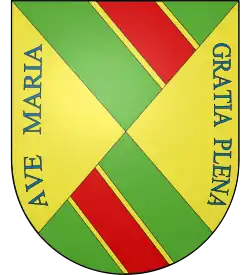Diego Hurtado de Mendoza, 3rd Duke of the Infantado
Diego Hurtado de Mendoza y Luna, 3rd Duke of the Infantado, nicknamed El Grande, (Arenas de San Pedro, Spain, 11 March 1461 – Guadalajara, Castile-La Mancha, Spain, 30 August 1531) was a Spanish noble.

He was born in one of the richest and most influential families of Castile.
He was the son of Íñigo López de Mendoza y Luna, 2nd Duke of the Infantado (* Guadalajara, Castile-La Mancha, 1438 - Guadalajara, Castile-La Mancha, 1500) and the grandson of Diego Hurtado de Mendoza, 1st Duke of the Infantado, (* Guadalajara, Castile-La Mancha, 1415 - Manzanares el Real, 1479). He became 3rd duke in 1500.
He married, first, circa 1491, Maria Pimentel y Pacheco (deceased 1499), daughter of Rodrigo Afonso Pimentel, 4th count and 1st duke of Benavente.
They had 4 children :
- Íñigo López de Mendoza, 4th Duke of the Infantado, (1493–1566).
- Rodrigo de Mendoza, 1st marquis of Montes-Claros.
- Ana, married Luis de la Cerda, 1st marquis of Cogolludo.
- Marina, married Diego Arias.
He remarried in 1530 with Maria Maldonado, no issue.
He participated in the conquest of Granada, distinguishing himself in the conquest of Loja.
He was a strong political opponent of Cardinal Cisneros and defended the rights of the nobles.
In 1519, he became a Knight of the Order of the Golden Fleece on proposal of King Charles I of Spain, a.k.a. Charles V, Holy Roman Emperor.
During the Revolt of the Comuneros in 1520 and 1521, the duke of Infantado played a cautious waiting game to see which side would win.
In 1521 he chose to support King Charles I, mostly because of his hate towards Bishop Acuña.
King Francis I of France stayed in his palace, after the King had been taken prisoner in the Battle of Pavia in 1525.
In his old age, the Duke suffered from gout and led a pious life.
The Catalan composer Mateo Flecha was in his service from 1525 until his death.
| Preceded by Íñigo López de Mendoza y Luna |
Duke of the Infantado 1500–1531 |
Succeeded by Íñigo López de Mendoza y Pimentel |